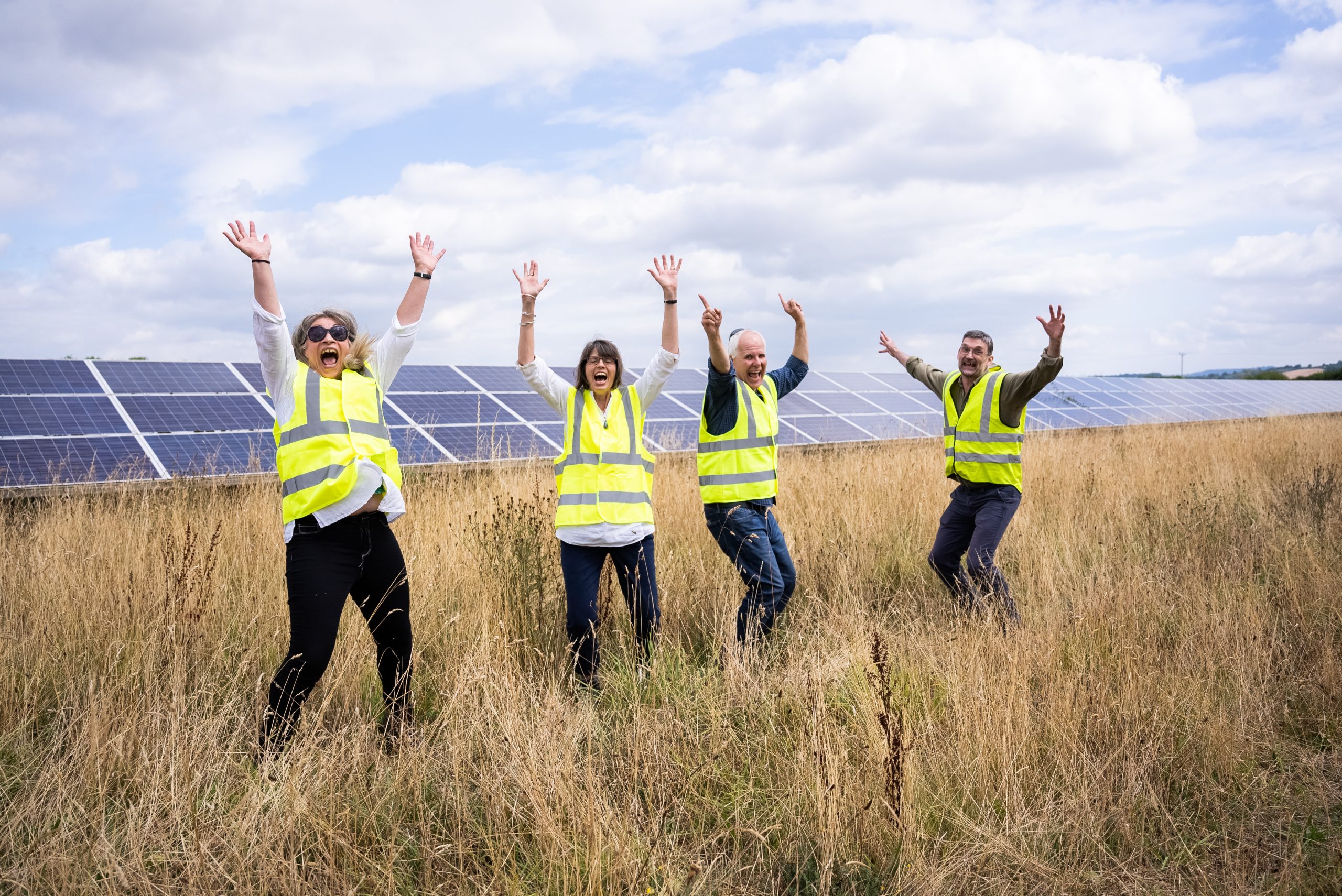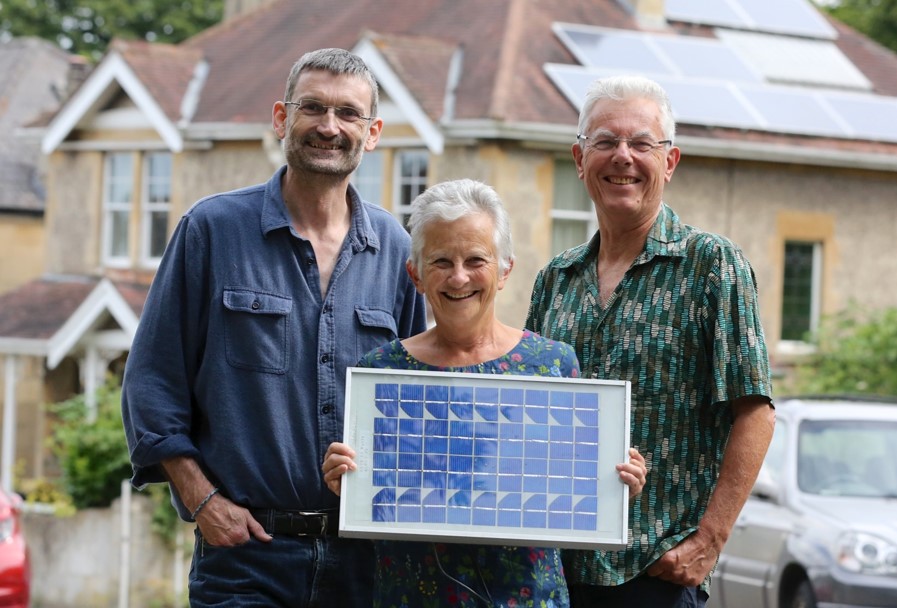Our Community Fund is open until 2nd November. Chair of Fund trustees Sophie Hooper Lea tells us why she got involved and shares her thoughts on the fund.
Tell us a little about your background
I jumped corporate ship in 1997 because I was disappointed and disillusioned by the lack of ethics in business and the disregard for the environment and social justice. I started out working with NGOs and charities like WWF and the RSA. However, as pressure on corporations increased and society’s expectations of business changed, I started to work with companies that realised they needed to address ethics, corporate responsibility and sustainability. I have now been an independent consultant in this area for 22 years and work part time while bringing up my three children.
Why did you get involved in the community fund?
I have always been impressed by BWCE and think it makes a good model for how a business can tackle sustainability. BWCE generates an income for local people from renewable energy. It provides a reasonable return to shareholders while also safeguarding the environment and adding social value. I was invited to be a trustee of the Fund in 2017 and was happy to help such a good cause. I became Chair of Trustees in 2018 and it is a real pleasure to be involved in handing out grants to deserving organisations that make a difference.
What does the Community Fund aim to do?
The BWCE Fund provides grants to local charities and community organisations to help them to reduce carbon emissions and/or tackle fuel poverty. This funding from BWCE allows grant recipients to keep small organisations going and to create projects that they could not have afforded to attempt without funding.
How is the fund managed and who makes the funding decisions?
The Fund has no paid employees so we pay Quartet Community Fund to administer the grant funding programme on our behalf. They receive applications, liaise with grant applicants and provide fund trustees with all the completed application forms.
All funding decisions are made by the trustees with Quartet providing analysis and advice to aid decision making. Once a year we have a big panel meeting where our trustees decide what to fund. We discuss every applicant and then all trustees have a say in each decision apart from those trustees who may be involved in some way with an organisation that has applied for a grant. In that case, the trustee declares a potential conflict of interest and absents themselves from the decision-making.
What’s new this year and why?
When the coronavirus struck, we worked with Quartet Community Foundation to assure grant recipients that we would be understanding and flexible about the projects we had funded. We told them that our priority was safety, not project delivery, and we are working with Quartet to agree ways to adapt the projects as necessary in this very changed world.
Lockdown and its repercussions means that it is very difficult to get funding for environmental projects at the moment, particularly as many funds are prioritising Covid response projects. So it really matters that a fund like this exists. This year we are still be focussing on reducing carbon emissions and tackling fuel poverty. However, we have changed our guidelines to welcome projects that would increase the resilience of local communities, as long as these projects also have an environmental aspect.
What have been the main highlights for you?
BWCE has given the BWCE Fund a really significant £195,000 since the Fund started in 2014, as well as giving a further £15,000 to South Dartmoor Community Energy for grants to projects close to BWCE’s Portworthy solar array. Apart from some administrative costs, the vast majority of the funding from BWCE has been spent on providing grants. The Fund has handed out over 58 grants worth £173,900 to date and those grants have all gone to local organisations that are doing vital work that benefits our local communities as well as the environment.
Can you pick out a couple of projects to highlight?
Last year we gave Transition Larkhall a grant to allow them to create an edible food forest garden at Alice Park Community Garden. This is a very special project because it is funded by the first legacy donation that the Fund has received. BWCE member Kate Hall sadly passed away last year in 2019 and her family very generously donated her shareholding to the Fund and chose this particular project. The project has been delayed somewhat because of coronavirus restrictions, but volunteers have worked tirelessly to create the forest garden. The forest garden will grow and develop over time, but is already offering inspiration to individuals looking for more sustainable gardening practices and innovative ways to grow food.
Another example of a project, which is really different, was when we gave Wellow Village Shop a grant in 2018 to buy energy efficient freezers. Village shops are an incredibly important resource for local communities and replacing their freezer saved them money on fuel bills, which helps to keep the shop running. So this kind of project works on a range of levels: it helps to protect a vital community resource for local people, reduces carbon emissions and saves money.
Have you had any frustrations?
The Fund is oversubscribed each year, which means that we have a lot more applications than we have funds available. There are so many deserving organisations out there who are doing a great job and I wish there was more funding available to them from government, business and elsewhere. I wish more people understood that business can be a force for good and did more to support social enterprises and community businesses like BWCE.
Do you have any tips for potential applicants?
It is really important to read and understand the guidelines for any grant funding programme. That way you can tailor your application to the fund’s requirements, aims and objectives. As a result, you will have a much better chance of success in obtaining funding. Also, only ask for as much money as you need and try to be as specific as you can, including a breakdown of costs and quotes for work as much as possible. We have a limited grant pot and a lot of applicants, so you are likely to have a better chance if you are asking for less money for a smaller project than if you are asking for the maximum £5,000 grant.
Remind us about the grant application deadline and who is eligible to apply
The 2020/21 grant programme opened on 14th September after BWCE members voted in favour of donating surplus income to the Fund again this year. The grant programme will close to applications at 9am on 2nd November so you need to get applications in before then. The grant programme is open to charities and community groups in Bath and the surrounding area. The guidelines will give you further detail on our geographic reach and the types of organisation that we can and can’t fund.
How do groups apply?
Groups should apply through Quartet Community Foundation by going to the BWCE Community Fund page
Quartet are also your first port of call if you have questions about the grant programme or the guidelines. You can contact Andy O’Sullivan on 0117 989 7748 or [email protected]


